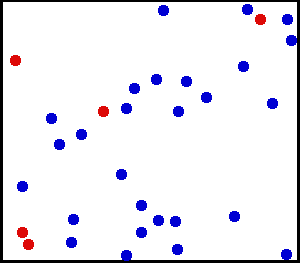What does kinetic theory mean?
Definitions for kinetic theory
ki·net·ic the·o·ry
This dictionary definitions page includes all the possible meanings, example usage and translations of the word kinetic theory.
Princeton's WordNet
kinetic theory, kinetic theory of gasesnoun
(physics) a theory that gases consist of small particles in random motion
Wikipedia
kinetic theory
The kinetic theory of gases is a simple, historically significant classical model of the thermodynamic behavior of gases, with which many principal concepts of thermodynamics were established. The model describes a gas as a large number of identical submicroscopic particles (atoms or molecules), all of which are in constant, rapid, random motion. Their size is assumed to be much smaller than the average distance between the particles. The particles undergo random elastic collisions between themselves and with the enclosing walls of the container. The basic version of the model describes the ideal gas, and considers no other interactions between the particles. The kinetic theory of gases explains the macroscopic properties of gases, such as volume, pressure, and temperature, as well as transport properties such as viscosity, thermal conductivity and mass diffusivity. Due to the time reversibility of microscopic dynamics (microscopic reversibility), the kinetic theory is also connected to the principle of detailed balance, in terms of the fluctuation-dissipation theorem (for Brownian motion) and the Onsager reciprocal relations. Historically, the kinetic theory of gases was the first explicit exercise of the ideas of statistical mechanics.
ChatGPT
kinetic theory
Kinetic Theory, also referred to as Kinetic Theory of Gases, is a scientific theory that explains the behavior and properties of gases. It states that gases are made up of numerous small particles, all of which are in constant, random motion. The kinetic energy of these particles is directly proportional to the temperature of the gas. This energy is responsible for all the properties of the gas such as its pressure, temperature, and volume. The theory also assumes that these particles don't have any forces acting between them except during their elastic collisions with each other and the container's walls.
Wikidata
Kinetic theory
The kinetic theory of gases describes a gas as a large number of small particles, all of which are in constant, random motion. The rapidly moving particles constantly collide with each other and with the walls of the container. Kinetic theory explains macroscopic properties of gases, such as pressure, temperature, and volume, by considering their molecular composition and motion. Essentially, the theory posits that pressure is due not to static repulsion between molecules, as was Isaac Newton's conjecture, but due to collisions between molecules moving at different velocities through Brownian motion. While the particles making up a gas are too small to be visible, the jittering motion of pollen grains or dust particles which can be seen under a microscope, known as Brownian motion, results directly from collisions between the particle and gas molecules. As pointed out by Albert Einstein in 1905, this experimental evidence for kinetic theory is generally seen as having confirmed the existence of atoms and molecules.
Matched Categories
Numerology
Chaldean Numerology
The numerical value of kinetic theory in Chaldean Numerology is: 9
Pythagorean Numerology
The numerical value of kinetic theory in Pythagorean Numerology is: 9
Translation
Find a translation for the kinetic theory definition in other languages:
Select another language:
- - Select -
- 简体中文 (Chinese - Simplified)
- 繁體中文 (Chinese - Traditional)
- Español (Spanish)
- Esperanto (Esperanto)
- 日本語 (Japanese)
- Português (Portuguese)
- Deutsch (German)
- العربية (Arabic)
- Français (French)
- Русский (Russian)
- ಕನ್ನಡ (Kannada)
- 한국어 (Korean)
- עברית (Hebrew)
- Gaeilge (Irish)
- Українська (Ukrainian)
- اردو (Urdu)
- Magyar (Hungarian)
- मानक हिन्दी (Hindi)
- Indonesia (Indonesian)
- Italiano (Italian)
- தமிழ் (Tamil)
- Türkçe (Turkish)
- తెలుగు (Telugu)
- ภาษาไทย (Thai)
- Tiếng Việt (Vietnamese)
- Čeština (Czech)
- Polski (Polish)
- Bahasa Indonesia (Indonesian)
- Românește (Romanian)
- Nederlands (Dutch)
- Ελληνικά (Greek)
- Latinum (Latin)
- Svenska (Swedish)
- Dansk (Danish)
- Suomi (Finnish)
- فارسی (Persian)
- ייִדיש (Yiddish)
- հայերեն (Armenian)
- Norsk (Norwegian)
- English (English)
Word of the Day
Would you like us to send you a FREE new word definition delivered to your inbox daily?
Citation
Use the citation below to add this definition to your bibliography:
Style:MLAChicagoAPA
"kinetic theory." Definitions.net. STANDS4 LLC, 2024. Web. 25 Apr. 2024. <https://www.definitions.net/definition/kinetic+theory>.



Discuss these kinetic theory definitions with the community:
Report Comment
We're doing our best to make sure our content is useful, accurate and safe.
If by any chance you spot an inappropriate comment while navigating through our website please use this form to let us know, and we'll take care of it shortly.
Attachment
You need to be logged in to favorite.
Log In